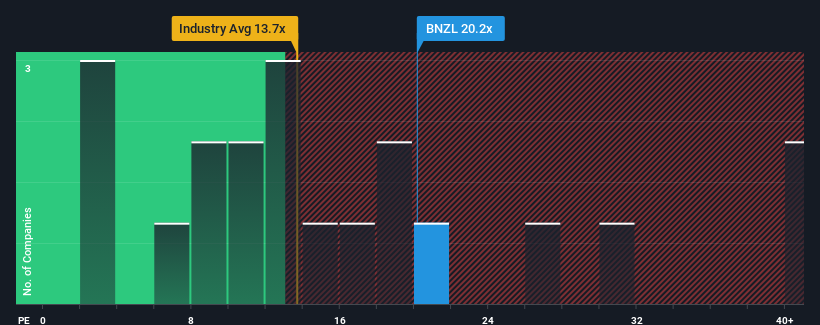- United Kingdom
- /
- Trade Distributors
- /
- LSE:BNZL
Some Shareholders Feeling Restless Over Bunzl plc's (LON:BNZL) P/E Ratio

Bunzl plc's (LON:BNZL) price-to-earnings (or "P/E") ratio of 20.2x might make it look like a sell right now compared to the market in the United Kingdom, where around half of the companies have P/E ratios below 16x and even P/E's below 9x are quite common. However, the P/E might be high for a reason and it requires further investigation to determine if it's justified.
Recent times have been pleasing for Bunzl as its earnings have risen in spite of the market's earnings going into reverse. It seems that many are expecting the company to continue defying the broader market adversity, which has increased investors’ willingness to pay up for the stock. If not, then existing shareholders might be a little nervous about the viability of the share price.
Check out our latest analysis for Bunzl

Is There Enough Growth For Bunzl?
There's an inherent assumption that a company should outperform the market for P/E ratios like Bunzl's to be considered reasonable.
Retrospectively, the last year delivered a decent 11% gain to the company's bottom line. EPS has also lifted 22% in aggregate from three years ago, partly thanks to the last 12 months of growth. Accordingly, shareholders would have probably been satisfied with the medium-term rates of earnings growth.
Shifting to the future, estimates from the analysts covering the company suggest earnings should grow by 2.4% per annum over the next three years. Meanwhile, the rest of the market is forecast to expand by 15% each year, which is noticeably more attractive.
With this information, we find it concerning that Bunzl is trading at a P/E higher than the market. It seems most investors are hoping for a turnaround in the company's business prospects, but the analyst cohort is not so confident this will happen. There's a good chance these shareholders are setting themselves up for future disappointment if the P/E falls to levels more in line with the growth outlook.
What We Can Learn From Bunzl's P/E?
While the price-to-earnings ratio shouldn't be the defining factor in whether you buy a stock or not, it's quite a capable barometer of earnings expectations.
We've established that Bunzl currently trades on a much higher than expected P/E since its forecast growth is lower than the wider market. When we see a weak earnings outlook with slower than market growth, we suspect the share price is at risk of declining, sending the high P/E lower. Unless these conditions improve markedly, it's very challenging to accept these prices as being reasonable.
It is also worth noting that we have found 2 warning signs for Bunzl that you need to take into consideration.
You might be able to find a better investment than Bunzl. If you want a selection of possible candidates, check out this free list of interesting companies that trade on a low P/E (but have proven they can grow earnings).
Valuation is complex, but we're here to simplify it.
Discover if Bunzl might be undervalued or overvalued with our detailed analysis, featuring fair value estimates, potential risks, dividends, insider trades, and its financial condition.
Access Free AnalysisHave feedback on this article? Concerned about the content? Get in touch with us directly. Alternatively, email editorial-team (at) simplywallst.com.
This article by Simply Wall St is general in nature. We provide commentary based on historical data and analyst forecasts only using an unbiased methodology and our articles are not intended to be financial advice. It does not constitute a recommendation to buy or sell any stock, and does not take account of your objectives, or your financial situation. We aim to bring you long-term focused analysis driven by fundamental data. Note that our analysis may not factor in the latest price-sensitive company announcements or qualitative material. Simply Wall St has no position in any stocks mentioned.
About LSE:BNZL
Bunzl
Operates as a distribution and services company in the North America, Continental Europe, the United Kingdom, Ireland, and internationally.
Excellent balance sheet with acceptable track record.

